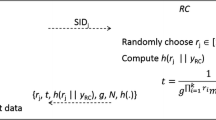Abstract
With the rapid growth of electronic commerce and associated demands on variants of Internet based applications, application systems providing network resources and business services are in high demand around the world. To guarantee robust security and computational efficiency for service retrieval, a variety of authentication schemes have been proposed. However, most of these schemes have been found to be lacking when subject to a formal security analysis. Recently, Chang et al. (2014) introduced a formally provable secure authentication protocol with the property of user-untraceability. Unfortunately, based on our analysis, the proposed scheme fails to provide the property of user-untraceability as claimed, and is insecure against user impersonation attack, server counterfeit attack, and man-in-the-middle attack. In this paper, we demonstrate the details of these malicious attacks. A security enhanced authentication scheme is proposed to eliminate all identified weaknesses.
Similar content being viewed by others
Explore related subjects
Discover the latest articles and news from researchers in related subjects, suggested using machine learning.References
Bellare, M., Rogaway, P., 1994. Entity authentication and key distribution. LNCS, 773:232–249.
Bellare, M., Pointcheval, D., Rogaway, P., 2000. Authenticated key exchange secure against dictionary attacks. Advances in Cryptology-EUROCRYPT, p.139–155.
Blake-Wilson, S., Johnson, D., Menezes, A., 1997. Key agreement protocols and their security analysis. 6th IMA Int. Conf. on Cryptography Coding, p.30–45.
Burrows, M., Abadi, M., Needham, R., 1990. A logic of authentication. ACM Trans. Comput. Syst., 8(1):18–36. [doi:10.1145/77648.77649]
Chang, C.C., Lee, C.Y., 2012. A secure single sign-on mechanism for distributed computer networks. IEEE Trans. Ind. Electron., 59(1):629–637. [doi:10.1109/TIE.2011.2130500]
Chang, Y.F., Tai, W.L., Chang, H.C., 2014. Untraceable dynamic-identity-based remote user authentication scheme with verifiable password update. Int. J. Commun. Syst., 27(11):3430–3440. [doi:10.1002/dac.2552]
He, D., Wu, S., 2012. Security flaws in a smart card based authentication scheme for multi-server environment. Wirel. Pers. Commun., 70(1):323–329. [doi:10.1007/s11 277-012-0696-1]
Hsiang, C., Shih, W.K., 2009. Improvement of the secure dynamic ID based remote user authentication scheme for multi-server environment. Comput. Stand. Interf., 31(6): 1118–1123. [doi:10.1016/j.csi.2008.11.002]
Hsieh, W., Leu, J., 2012. Exploiting hash functions to intensify the remote user authentication scheme. Comput. Secur., 31(6):791–798. [doi:10.1016/j.cose.2012.06.001]
Huang, X., Chen, X., Li, J., et al., 2013. Further observations on smart-card-based password-authenticated key agreement in distributed systems. IEEE Trans. Parall. Distr. Syst., 25(7):1767–1775. [doi:10.1109/TPDS.2013.230]
Juang, W.S., Chen, S.T., Liaw, H.T., 2008. Robust and efficient password-authenticated key agreement using smart cards. IEEE Trans. Ind. Electron., 55(6):2551–2556. [doi:10.1109/TIE.2008.921677]
Kumari, S., Khan, M.K., 2014. Cryptanalysis and improvement of a robust smart-card-based remote user password authentication scheme. Int. J. Commun. Syst., 27(12): 3939–3955. [doi:10.1002/dac.2590]
Lamport, L., 1981. Password authentication with insecure communication. Commun. ACM, 24(11):770–772. [doi:10.1145/358790.358797]
Li, C.T., Lee, C.C., Liu, C.J., et al., 2011. A robust remote user authentication scheme against smart card security breach. 25th Annual IFIPWG11. 3 Conf., p.231–238
Li, X., Qiu, W., Zheng, D., et al., 2010. Anonymity enhancement on robust and efficient password-authenticated key agreement using smart cards. IEEE Trans. Ind. Electron., 57(2):793–800. [doi:10.1109/TIE.2009.2028351]
Li, X., Xiong, Y., Ma, J., et al., 2012. An efficient and security dynamic identity based authentication protocol for multiserver architecture using smart cards. J. Network Comput. Appl., 35(2):763–769. [doi:10.1016/j.jnca.2011. 11.009]
Liao, Y.P., Wang, S.S., 2009. A secure dynamic ID based remote user authentication scheme for multi-server environment. Comput. Stand. Interf., 31(1):24–29. [doi:10. 1016/j.csi.2007.10.007]
Sood, S.K., Sarje, A.K., Singh, K., 2011. A secure dynamic identity based authentication protocol for multi-server architecture. J. Network Comput. Appl., 34(2):609–618. [doi:10.1016/j.jnca.2010.11.011]
Sun, D.Z., Huai, J.P., Sun, J.Z., et al., 2009. Improvements of Juang et al.’s password-authenticated key agreement scheme using smart cards. IEEE Trans. Ind. Electron., 56(6):2284–2291. [doi:10.1109/TIE.2009.2016508]
Tsai, J.L., Lo, N.W., Wu, T.C., 2013. Novel anonymous authentication scheme using smart cards. IEEE Trans. Ind. Inform., 9(4):2004–2013. [doi:10.1109/TII.2012.2230639]
Wang, D., Ma, C.G., 2012. Cryptanalysis and security enhancement of a remote user authentication scheme using smart cards. J. China Univ. Posts Telecommun., 19(5): 104–114. [doi:10.1016/S1005-8885(11)60307-5]
Wang, D., Wang, P., 2013. Offline dictionary attack on password authentication schemes using smart cards. 16th Information Security Conf., p.1–16.
Wang, D., Wang, P., 2014. On the anonymity of two-factor authentication schemes for wireless sensor networks: attacks, principle and solutions. Comput. Networks, 73:41–57. [doi:10.1016/j.comnet.2014.07.010]
Wang, D., Ma, C., Wang, P., et al., 2012a. Pass: privacy preserving two-factor authentication scheme against smart card loss problem. Cryptology ePrint Archive, 439:1–35.
Wang, D., Ma, C., Wang, P., 2012b. Secure password-based remote user authentication scheme with non-tamper resistant smart cards. 26th Annual IFIP Conf. on Data and Applications Security and Privacy, p.114–121.
Wang, D., He, D., Wang, P., et al., 2014. Anonymous twofactor authentication in distributed systems: certain goals are beyond attainment. IEEE Trans. Depend. Secure Comput., in press. [doi:10.1109/TDSC.2014.2355850]
Wang, G., Yu, J., Xie, Q., 2013. Security analysis of a single sign-on mechanism for distributed computer networks. IEEE Trans. Ind. Inform., 9(1):294–302. [doi:10.1109/TII.2012.2215877]
Wang, Y., 2012. Password protected smart card and memory stick authentication against off-line dictionary attacks. 27th IFIP TC 11 Information Security and Privacy Conf., p.489–500.
Yeh, K.H., Lo, N.W., Li, Y., 2011. Cryptanalysis of Hsiang-Shih’s authentication scheme for multi-server architecture. Int. J. Commun. Syst., 24(7):829–836. [doi:10.1002/dac.1184]
Author information
Authors and Affiliations
Corresponding author
Additional information
Project supported by the Taiwan Information Security Center (TWISC) and the Ministry of Science and Technology, Taiwan (Nos. MOST 103-2221-E-259-016-MY2 and MOST 103-2221-E-011-090-MY2)
ORCID: Kuo-Hui YEH, http://orcid.org/0000-0003-0598-761X
Rights and permissions
About this article
Cite this article
Yeh, KH. A lightweight authentication scheme with user untraceability. Frontiers Inf Technol Electronic Eng 16, 259–271 (2015). https://doi.org/10.1631/FITEE.1400232
Received:
Accepted:
Published:
Issue Date:
DOI: https://doi.org/10.1631/FITEE.1400232




